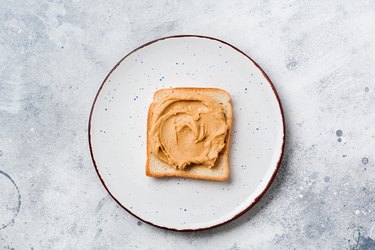
Despite its name, the 3-Day Mayo Clinic Diet did not originate with, nor was it ever endorsed by, the renowned Mayo Clinic. It's just another fad diet that touts speedy weight loss — up to 10 pounds in three days.
The Mayo Clinic name is wrongfully associated with several types of fad diets that promise quick weight loss in a short time, like the Grapefruit Diet and the Cabbage Soup Diet. While these diets may include some healthy foods, they are not healthy or sustainable options for weight loss.
Video of the Day
Video of the Day
"These fad diets did not originate from the Mayo Clinic as they do not meet the Mayo Clinic's principles. We believe that the (real) Mayo Clinic Diet isn't even a diet — it's a lifestyle approach that warrants behavioral changes for long-term sustainability," Katherine Zeratsky, RD, LD, a dietitian with the Mayo Clinic, tells LIVESTRONG.com.
So, What Is the 3-Day Diet?
The 3-Day Mayo Clinic Diet — sometimes called the 3-Day Diet or The Military Diet — promises that you can lose 6 to 10 pounds in three days. How? It's a very low-calorie menu that involves eating fruits, vegetables and protein with few carbohydrates or fats, and lots of water.
For example, breakfast each day will have a carbohydrate and protein, like toast with peanut butter, a piece of cheese or an egg. Lunch has the same combo — like bread with tuna or cottage cheese. And dinner might include a small serving of skinless chicken, 1 cup of broccoli, 1 cup of asparagus, 1 piece of fruit and a half cup of vanilla ice cream.
Why You Shouldn't Try This Diet
As a rule of thumb, losing 1 to 2 pounds a week is the safest way to slim down. A low-calorie fad diet like the 3-Day Mayo Clinic Diet or the Grapefruit Diet will only cause short-term weight loss, as these eating plans mostly cause a loss of water and muscle mass, not fat loss, according to the American Academy of Family Physicians.
The 3-Day Diet is so food-restrictive it would be difficult to stay on it long term. And there's a good chance you can gain back the weight you lost, and possibly more.
"When diets are so restrictive, not only will they cause nutrient deficiencies, but they're also not sustainable. If a diet promises something that's too good to be true, chances are you won't be able to maintain the weight loss," Zeratsky says.
Following a high-protein, low-carb diet long-term not only results in nutrient deficiencies but also other negative side effects. The Mayo Clinic warns that high protein consumption can lead to bad breath, headache and constipation. What's more, some high-protein diets, when they include foods like red meat and full-fat dairy, may boost the risk of heart disease.
And consider this: New research suggests it's not the type of macronutrient diet you follow (like one high in protein, carbohydrates or unsaturated fats) that makes a difference in reducing the risk of heart disease; rather, it's the nutritious foods you eat.
An August 2019 study in the International Journal of Cardiology followed 164 adults with high blood pressure or hypertension, who were split into three groups that followed different diets. Each diet was rich in fruits and veggies, lean meats and fiber. Ultimately, all three diets reduced heart injury and inflammation in people with risk factors for heart disease. Emphasizing one macronutrient or another was less important than eating an overall nutritious diet.
And cutting out an entire food group (like carbohydrates) can have repercussions. Your body uses carbs as fuel to keep it going. A low-carb diet decreases insulin levels, which forces your body to burn stored fat for energy (because you're not getting any energy from your food). That can cause weight loss, but it may also cause fatigue in some people, according to the Mayo Clinic.
A Better Way to Lose Weight
The most effective diet for safe, maintainable weight loss as well as improved health is one that includes a wide variety of fruits and vegetables, whole grains and low-fat protein sources as well as consistent physical activity.
The real Mayo Clinic Diet is a lifestyle approach that gives you the resources to make these new balanced and sustainable habits. It's based on the Mayo Clinic Healthy Food Pyramid, which serves as a guide: Eat most of your food from the groups at the bottom of the pyramid and less from the top — and don't forget to exercise!
"We, at the Mayo Clinic, want people to eat a variety of foods in each food group in a way that fits their customary patterns and meets their nutritional needs — foods that they enjoy and foods that are nutritious," Zeratsky affirms.
- American Academy of Family Physicians: "Nutrition for Weight Loss: What You Need to Know About Fad Diets"
- Mayo Clinic: "Are High Protein Diets Safe for Weight Loss?"
- International Journal of Cardiology: "Healthy Diet Reduces Markers of Cardiac Injury and Inflammation Regardless of Macronutrients: Results from the OmniHeart Trial"
- Mayo Clinic: "Low-Carb Diet: Can it Help You Lose Weight?"
- Mayo Clinic: "Mayo Clinic Healthy Weight Pyramid: A Sample Menu"
Was this article helpful?
150 Characters Max
0/150
Thank you for sharing!
Thank you for your feedback!